

MXQ LLC
MXQ is a company with over 20 years’ experience in the distribution, packaging, installation, commissioning, and maintenance of industrial fluid handling systems.
Benefits of Using MXQ’s Progressive Cavity Pumps for Wastewater Treatment. Progressive cavity pumps have been one of the regular choices for wastewater treatment industries.

These pumps are designed for transporting abrasive and highly viscous fluids in wastewater streams. Thus, the unique designs of these pumps make them ideal for pumping thickened liquids such as waste activated sludge. At times, sludge contains pump clogging matter such as fibers, large solids, and rags, which may settle in digesters and form masses that cannot be processed by the PC pump.
These wastewater streams may also contain solid waste material such as small rocks that may damage the pump’s stator or rotor. Fortunately, a Texas-based governmental entity have discovered an effective solution with MXQ’s progressive cavity pump. An Overview of Wastewater Treatment Challenges Faced by Texas Based Governmental Entity The customer is a leading governmental entity that processes wastewater from petrochemical industries and municipalities.
Advantages of Liquid Ring Vacuum Pumps. Liquid ring vacuum pumps are increasing in popularity and availability nowdays.
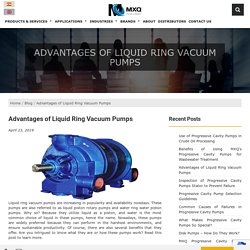
These pumps are also referred to as liquid piston rotary pumps and water ring water piston pumps. Why so? Because they utilize liquid as a piston, and water is the most common choice of liquid in these pumps, hence the name. Nowadays, these pumps are widely preferred because they can perform in the harshest environments, and ensure sustainable productivity. Of course, there are also several benefits that they offer. What Makes Progressive Cavity Pumps So Special? A progressive cavity pump is referred by different names, such as eccentric screw pump, progg cavity pump, or cavity pump.
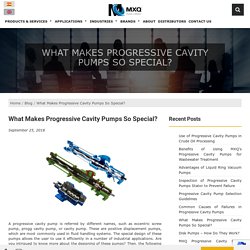
These are positive displacement pumps, which are most commonly used in fluid handling systems. The special design of these pumps allows the user to use it efficiently in a number of industrial applications. Are you intrigued to know more about the designing of these pumps? Then, the following post will help you to understand it. Disk Pumps – How Do They Work? In the coating industry, various types of pumps are used for pumping abrasive fluids.
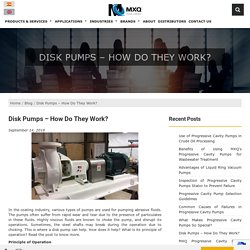
The pumps often suffer from rapid wear and tear due to the presence of particulates in these fluids. Highly viscous fluids are known to choke the pump, and disrupt its operations. Sometimes, the steel shafts may break during the operation due to choking. This is where a disk pump can help. How does it help? Principle of Operation The disk pumps make use of nature’s dynamic forces – laminar flow, viscous drag, and boundary layer. An Overview of Disk Pump Operation The disk pump follows a natural dynamic principle – boundary layer – viscous drag, which is a non-impingement and non-contact technology. Under non-turbulent (laminar) flow conditions, the layers of liquid travel at different velocities.
Benefits of Using MXQ’s Progressive Cavity Pumps for Wastewater Treatment. Innovative Design Features of the MXQ Progressive Cavity Pump - MXQ. Elongated Profile Stator & Rotor Recognizing the need for longer pump life in progressive cavity (PC) style pumps, MXQ has standardized on a unique rotor and stator profile that has proven extremely beneficial to PC pump users.
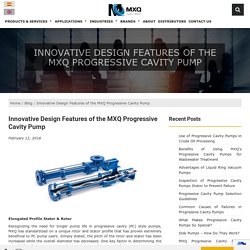
Simply stated, the pitch of the rotor and stator has been increased while the overall diameter has decreased. One key factor in determining the overall life of the PC pump is the peripheral surface speed of the rotor against the stator (rubbing velocity), this new profile was designed to reduce the rubbing velocities, and increase the pump’s rotor/stator life expectancy.
Testing proves the new profile increases the life of the pump by as much as 40% over standard profiles. Additionally, the elongated profile rotor/stator geometry are lower thrust loads on the joints and bearings, lower starting torque requirements and reduced shearing imparted on the fluid. Universal Cardan Joint (3 year warranty) MXQ – Standard Features. Use of Progressive Cavity Pumps in Crude Oil Processing. Crude oil processing is carried out in an oil refinery.
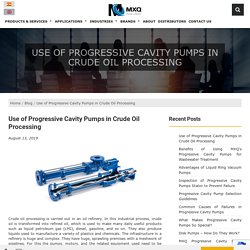
In this industrial process, crude oil is transformed into refined oil, which is used to make many daily useful products such as liquid petroleum gas (LPG), diesel, gasoline, and so on. They also produce liquids used to manufacture a variety of plastics and chemicals. The infrastructure in a refinery is huge and complex. They have huge, sprawling premises with a meshwork of pipelines. For this the pumps, motors, and the related equipment used need to be robust and resistant to abrasive chemicals, slurries, oil impurities, and semi-solid fluids.
How is Crude Oil Processed? Crude oil is a dark and unusable sticky fluid mixture of hydrocarbons, which needs refining to turn into a useful commodity. Crude oil is heated until the boiling point.A distiller is used to separate the boiling fluid from gases and other liquids.These liquids are used to make automotive fuels such as petrol and diesel.The distiller is hottest at the bottom.